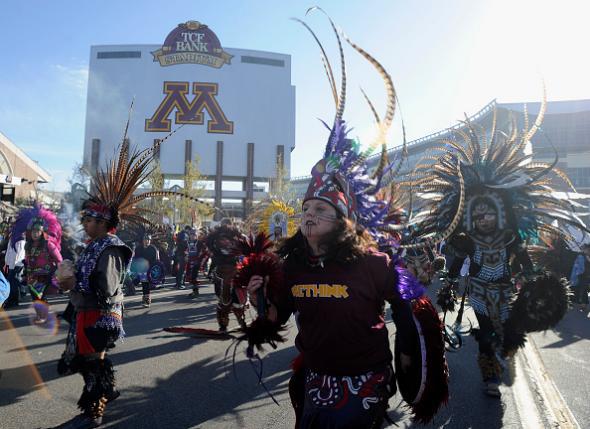One of the most-cited data points in the long-running debate over the Washington NFL franchise’s team name and mascot is a 2004 survey by the Annenberg Public Policy Center that found that 90 percent of Native Americans were not offended by the name. The survey, not surprisingly, is often used by the name’s defenders as evidence that it doesn’t need to be changed. But critics of the name believe the study’s methodology was flawed for a few reasons:
- It only involved landline telephones, which could have skewed the results toward older and more conservative respondents.
- It didn’t include citizens of Alaska and Hawaii, two states with high Native populations where debates over mascot issues might be more prominent.
- It posed the question “As a Native American, do you find that name offensive or doesn’t it bother you?”—a phrasing that’s ambiguous, since something can be bothersome but not offensive (for example: a mosquito bite) or theoretically offensive but not actively bothersome (for example: an antiquated racial slur).
- It allowed respondents to self-identify as Native American, which could hypothetically mean that individuals who casually claim to have Indian ancestry, but are mistaken could have been included. (Annenberg researchers have since pointed out, if I’m reading their response correctly, that the people who answered the Washington questions were actually participants in a broader survey about a broader set of topics and had been asked to identify themselves as members of one—and only one—racial group before any Washington-specific questions were asked.)
The Washington Post on Thursday published the results of a new survey, conducted by a company called Social Science Research Solutions, that addresses some of these concerns.
- It involved both landlines and cellphones.
- It covered Alaska and Hawaii and was designed to yield results that were representative of the United States’ Native American population as a whole.
- It asked the original Annenberg question but also included more direct queries such as “In general, do you feel the term ‘Redskin’ is disrespectful of Native Americans, or not?”
- It only included inviduals who responded that they were Native American when asked “Do you consider yourself white, black or African American, Asian, Native American, Pacific Islander, mixed race or some other race?”
The survey results, even with these tweaks, still indicate that Washington’s name is not widely considered offensive and is not an issue of great concern to Native Americans:
A general feeling among Native Americans that the name is inconsequential does not necessarily mean that it shouldn’t be changed, activist groups have already pointed out, and the list of Native groups who have formally backed a change remains extensive. The survey’s existence also doesn’t mean the people who run the Washington franchise aren’t mendacious dopes, or that the rest of us can now go back to ignoring the other more pressing problems in Native communities altogether. But it does mean, despite several years of high-profile controversy, there does not appear to be a groundswell of Native American antipathy toward what Slate will continue to refer to as the Washington NFL team.
